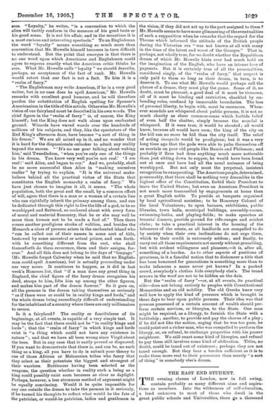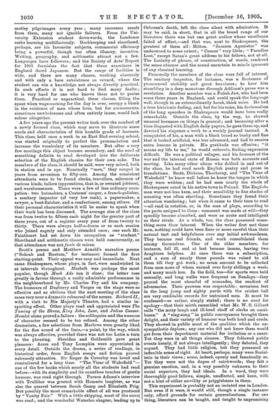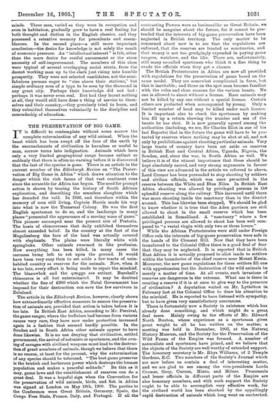motley pilgrimages every year ; many successes result from them,
many not ignoble failures. From the Uni- versity Extension student downwards, the Londoner seeks learning multifariously. Bookkeeping and shorthand, perhaps, are his favourite subjects, commercial efficiency being a powerful, though too often illusory, incentive. Writing, geography, and arithmetic attract not a few. Languages have followers; and the Society of Arts' Report for 1905 furnishes the fact that three examinees in England dared Japanese. But the range of facilities is wide, and there are many classes, working obscurely and with only a bare subsistence as reward, where the student can win a knowledge not always directly practical. In such efforts it is not hard to find many faults ; it is very hard for one who knows them not to praise them. Practical or unpractical, these classes, filling the space when wage-earning for the day is over, occupy a blank in the existence of men whose lives, but for amusements, sometimes unwholesome and often entirely inane, would lack colour altogether.
A few years ago the present writer took over the conduct of a newly formed class, which may serve to illustrate some needs and characteristics of this humble grade of learners. This class, held once a week in an East End evening school, was started originally to perfect the pronunciation and increase the vocabulary of its members. But after a very few meetings this object became secondary, and the need of something definite to read developed into the deliberate selection of the English classics for their own sake. The members of the class, it should be said, were very mixed, both in station and in age. Nominally "men," they ranged in years from seventeen to fifty-one. Among the consistent attendants were to be found clerks, travellers, salesmen of various kinds, tailors (apprentices, that is, or sweated jobbers), and warehousemen. There were a few of less ordinary occu- pation: two hatmakers, a Customs' cooper, a french-polisher, a sanitary inspector (of very low rank), a papermaker, a sawyer, a boot-finisher, and a confectioner, among others. Of their personal characteristics it will be easier to speak when their work has been discussed. The average size of the class was from twelve to fifteen each night for the greater part of three years, out of a register every year of from twenty to thirty. There were always half-a-dozen or so each session who joined eagerly and only attended once; one such Mr. Faintheart had set down his occupation as "student." Shorthand and arithmetic classes were held concurrently, so that attendance was not faute de mieux.
Scott's poems and Matthew Arnold's narrative poems (" Sohrab and Rustnm," for instance) formed the first starting-point Their appeal was easy and immediate. Next came Shakespeare, whose plays, in fact, were sandwiched in at intervals throughout. Macbeth was perhaps the most popular, though Much Ado ran it close; the latter rose greatly in favour through a really admirable performance in the neighbourhood by Mr. Charles Fry and his company. The humours of Dogberry and Verges on the stage were so effective and so obvious that the next meeting of the class came very near a dramatic rehearsal of the scenes. Richard IL, with a visit to His Majesty's Theatre, had a similar in- spiriting effect. Other plays read and appreciated were The Taming of the Shrew, _King John, Lear, and Julius Caesar. Hamlet alone proved a failure; the soliloquies and the nuances of character seemed to be too refined. Among the other dramatists, a few selections from Marlowe were greatly liked for the fine sound of the lines,—a point, by the way, which was always effective, provided there was not too Latin a turn to the phrasing. Sheridan and Goldsmith gave great pleasure : Acres and Tony Lumpkin were appreciated in every detaiL Outside the drama, a series of readings, in historical order, from English essays and fiction proved extremely attractive. Sir Roger de Coverley was loved and remembered for a long time. "The Vicar of Wakefield "— one of the few books which nearly all the students had read before—with its simplicity and its countless touches of gentle humour, was read right through. Parson Adams's interview with Trnlliber was greeted with Homeric laughter, as was also the quarrel between Sarah Gamp and Elizabeth Prig. But possibly the most remarkable effect of all was produced by "Vanity Fair." With a little skipping, most of the novel was read ; and the wonderful Waterloo chapter, leading up te Osborne's death, left the class silent with admiration. It may be said, in short, that in all the broad range of our literature there was but one great author whose excellence failed of effect,—and that was, next to Shakespeare, the greatest of them all : Milton. "Samson Agonistes " was understood to some extent; " Comns " very little ; "Paradise Lost," except Satan's great address to his fellows, not at all. The Latinity of phrase, of construction, of words, rendered the sense obscure and the sound uncertain to minds ignorant of any classical learning.
Personally the members of the class were full of interest. The sanitary inspector, for instance, was a Scotsman of pronounced stolidity and great heaviness ; to bear him stumbling in a deep monotone through Addison's prose was a revelation. Another member was a Polish Jew, who had been some three years in England, and could speak the language well, though in an extraordinarily harsh, thick voice. He had a true histrionic feeling, and, but for his voice, his declamation of the long speeches in Shakespeare would have been really remarkable. Outside the class, by the way, he showed unusual keenness on things in general; and becoming after a time disgusted with English daily papers, he gave them up, and devoted his sixpence a week to a weekly journal instead. A compatriot of his, a man with a black beard so bushy and fine that it looked artificial, was less advanced, and bad to receive extra lessons in private. His gratitude was effusive ; "it means my life to me," he would reiterate, finding expression difficult. He was a political refugee, and his forecast of the war and the internal state of Russia was both accurate and moving. Like many other aliens who drifted in and out of the class, he had read much English poetry and prose in translations. Scott, Dickens, Thackeray, and "The Vicar of Wakefield" he knew well before he knew the tongue in which they were written ; and he had seen nearly the whole of Shakespeare acted in his native town in Poland. The English- men were not less keen, and their sensibility to fine shades of meaning was often startling. Sometimes they found their attention wandering ; but when it came to their turn to read —all read in rotation, or, in the case of plays, according to the parts assigned to them : comment was made at will—they speedily became absorbed, and were as acute and intelligent as their rivals. As a whole, too, the class possessed some- thing more than interest. When the writer first met these men, nothing could have been finer or more careful than their natural tact and helpfulness over any initial awkwardness. They became real friends, and work consolidated them among themselves. One of the older members, for instance, fell ill, and at last became insane, leaving two daughters helpless. At once there was a subscription, and a sum of nearly three pounds was raised to aid them till they got work ; no mean amount to be collected from men none of whom earned over forty shillings a week, and many much less. In the field, too—for sports were held annually, and long walks were frequent on Sundays—they proved the most cheerful of comrades, the readiest of adversaries. Their prowess was respectable : seventeen feet in the long jump and eighty yards with the cricket ball are very creditable records for untrained men. It must be confessed—or rather, simply stated; there is no need for apology—that their mirth resembled what Mr. W. S. Gilbert calls "the noisy laugh and ill-bred chaff of clerks on omni- buses." A " sing-song " in public conveyances brought them delight, and their variety of humour was both loud and crude. They showed in public most of the qualities which the un- sympathetic deplore; any one who did not know them would get from their deportment material for irritation or a sneer. Yet they were in all things sincere. They followed publics events keenly, if not always intelligently ; they debated, they argued. They had little religion, but they possessed an inflexible sense of right. At heart, perhaps, many were Social- istic in their views ; some, indeed, openly and fanatically so. Yet they were not the dupes of catchwords; they felt a genuine emotion, and, in a way possibly unknown to their social superiors, they had ideals. In a word, they were thoroughly good fellows, simple, unaffected, and keen, with not a hint of either servility or priggishness in them.
This experiment is probably not an isolated one in London. But even if it were, it would still, though a single instance only, afford grounds for certain generalisations. For one thing, literature can be taught, and taught to unpromising minds. These men, varied as they were in occupation and even in habitation, gradually grew to have a real feeling for both thought and diction in the English classics, and they possessed a retentive memory for precedents and resem- blances. In the second place—a still more important conclusion—the desire for knowledge is not solely the result of economic pressure. An 'intellectual interest" is felt, other than the mere desire for restful amusement or the stern necessity of self-improvement. The members of this class were typical of several overlapping social strata, from the decent working man up to the clerk just rising into humble prosperity. They were not selected candidates, not the semi- fabulous persons eager to "rise above their stations," but simple ordinary men of a type to be seen by the thousand in any great city. Perhaps their knowledge did not last ; perhaps it was never even real. But had they learnt nothing at all, they would still have done a thing of service to them- selves and their country,—they genuinely tried to learn, and they submitted themselves voluntarily to the discipline and comradeship of education.




















































 Previous page
Previous page